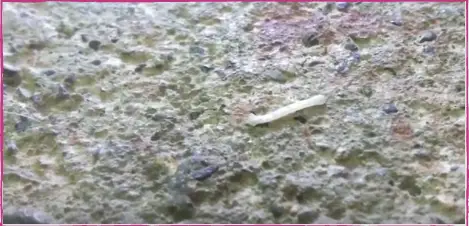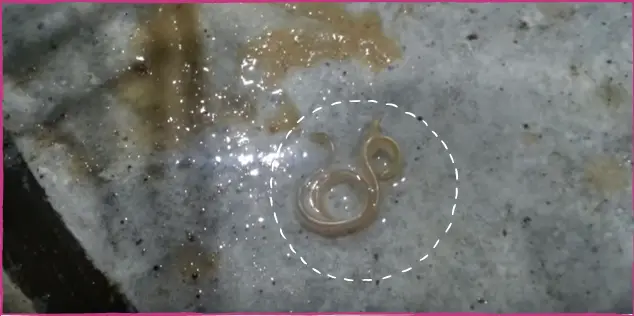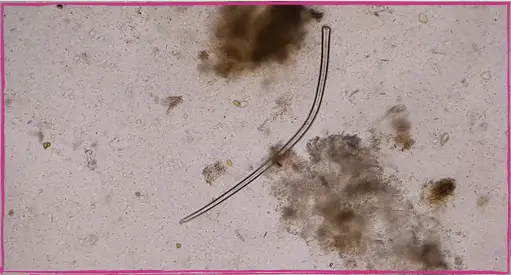It’s every pet parent’s worst nightmare: your fur baby has worms! Yuk.
These annoying little parasites can cause a ton of problems for your pet, including diarrhea, vomiting, weight-loss, and even anemia.
The good news is, tapeworms are easy to identify and treat at home! In this article, we’ll talk about how to identify different types of worms and treat them with over the counter medications.
The Most Common Types Of Cat Worms and How To Identify Them
Before we get started, let’s make sure that your cat has tapeworms. Here’s how to identify different worms which are common in cats.
Does your cat have a tapeworm?

If you’ve seen something that looks like maggots in your cat’s bum or poop, then tapeworms are the culprit. These little wriggling segments are also sometimes described as “moving grains of rice”, as seen in the above image.
How do cats get tapeworms?
Cats can sometimes get these parasites from uncooked meat or prey animals like mice, but did you know that fleas cause worms too? If your cat eats some of their fleas while trying to get them off, then they can acquire a nasty tapeworm. That’s why proper flea prevention is important!
Can humans get tapeworms from cats?
It’s possible but unlikely. In order to get a tapeworm from your cat you’d need to ingest the eggs. As long as you’re washing your hands, this is unlikely, but small children can be at risk.
How to get rid of tapeworms
The best and most cost-effective product for getting rid of tapeworms is Bayer’s OTC dewormer. I’ve personally used this product when our cat got tapeworms and it works very fast.
You can crush up the pill in some wet cat food or tuna, but make sure to hide it well because some sneaky cats will eat around it! Within a few days you should have no signs up tapeworms.
Note: If you are still seeing tapeworms after 3 days make sure your cats have no fleas! They may be getting re-infested from them.
Does your cat have round worms?

If your cat has round worms it can be hard to tell. The outward signs will not be as apparent as they are with tapeworms, but if your pet seems to be losing weight, feeling sick or not eating as well as they should be, these guys may be to blame.
If your cat is throwing up worms as shown above, then you can be pretty certain of a roundworm infestation. If your cat has been sick lately, make sure to inspect the remnants for any unwelcome guests.
How do cats get round worms?
While sometimes animals can get roundworms by eating bugs, like roaches, starting at the litter box is probably more likely.
Make sure to completely clean and sterilize the litter box with hot water and preferably a bleach mixture. You may also want to rent a steam cleaner to do the carpets and possibly the furniture as well.
Can humans get roundworms from cats?
Much like tapeworms, it’s unlikely that you will get these from your cat. It would require ingesting the eggs. Make sure to wash your hands thoroughly after handling your animals to protect yourself.
How to get rid of round worms
Using a treatment like this one makes it cheap and easy to be rid of roundworms. This one is a liquid medication that’s easy to mix in with some wet food or tuna.
Keep in mind though that this medication only works on roundworms. So, make sure you’re absolutely sure that this is the kind of worm that your cat has before you buy it.
You should also know that roundworms are very persistent. The medication kills only the live roundworms and not the eggs. You’ll need to follow a strict cleaning regiment and administer several rounds of medication before they are completely gone.
Does your cat have hookworms?

If your cat is an indoor cat, then hookworms are much less likely than the other two. This is because hookworms are acquired through the outdoors via skin contact.
Hookworms are also harder to identify, because they don’t have any visual cues like tapeworms do. Watch your cat closely for signs of labored breathing, bloody or black “tarry” stool, lesions between their toes, fatigue, coughing, loss of appetite, or an unwell appearance.
If you see any of these symptoms go to to the vet right away!
How do cats get hookworms?
Hookworms are picked up by walking around outside barefoot. Humans can easily get hookworms this way too, and it’s possible a human even brought them into the house and not the cat or dog. These worms enter your body through the skin, making them more dangerous than tapeworms or roundworms.
Can humans get hookworms from cats?
YES. Humans can easily get hookworms from cats or dogs. Hookworms enter through the skin, usually your feet. If your cat is found to have hookworms you should check your body for odd rashes, and look out for breathing issues, fever, abdominal pains, diarrhea, extreme fatigue, or signs of anemia. If you experience any of these symptoms, go get tested.
How do you get rid of hookworms?
If you think your cat has hookworms go to the vet immediately. Hookworms are far more dangerous than other worms for both your cat and yourself, and you don’t want to mess around with it.
Hookworms can cause severe internal damage which you will not be able to see. If your cat does not receive medical attention they may die.
How to prevent re-infestation of hookworms
Hookworm’s lay their eggs in feces. These eggs then mature and turn into the larvae which can enter the skin.
Start by keeping the litter box extra clean. Dump and clean the entire box with hot water and bleach solution to kill any eggs. Then scoop it as soon as you can when they poop in it.
If you also have dogs, try to dispose of their poop as well when they go outside. Dogs can get hookworms as well, and this could create a never ending cycle of hell for you.
If you live in an area where hookworms are very common, you may want to use a broad spectrum dewormer product on all of your animals a couple times per year, just to be safe.
I’m still not sure what kind of worms I have?!
If you suspect that your cat may be infested but you’re still not sure, then you have a few options.
- Use a broad spectrum worm treatment
If you’re fairly certain that you know your cat has worms, but you’re not sure exactly which kind, then you can use Bayer’s broad spectrum dewormer. It treats all of the common types of worms your cat will likely contract.
- Go to the vet for testing
You can go to the vet and have your animal’s stool sample tested. The vet will be able to tell you exactly what kind of worms you’re dealing with and recommend the correct treatment.
- Use an at home testing kit
You can actually purchase an at home testing kit for this. Take your sample, mail it to the lab, and they will report back within 24 hours of receipt with your information. They can identify pretty much any type of worm in almost any animal, not just cats!
Cat Deworming FAQ
Should I quarantine my cat with tapeworms?
Unless one cat has fleas and the other doesn’t, it’s unlikely that separating your cats will make much difference. Make sure your house is flea free and give both cats the tapeworm treatment. Tapeworm eggs are passed through an intermediate host, like fleas.
However, if you have roundworms, then separating them might be necessary. These worms can be more easily transmitted through sharing a litter box and grooming each other.
How long to keep cats separated after deworming?
In most cases, keeping the litter box environment clean should be enough to keep new roundworm eggs from being implanted.
If you seem to be struggling, then separating your cats for a couple of weeks and giving them their own litter boxes could help. Keep them from grooming each other and wash your hands to avoid inadvertently transferring eggs from one cat to another.
Does deworming cause diarrhea in kittens and cats?
Deworming medications can sometimes cause diarrhea in cats and kittens. However, sometimes this is an effect of the worms themselves.
How long will a cat have diarrhea after deworming?
Vomiting and diarrhea should last no more than a few days. If their symptoms persist then their may be something wrong. Sometimes cats can become impacted after deworming, especially kittens. If you notice your cat has abdominal pain, or difficulties using the litter box, go to the vet.
Do cats poop out worms after being dewormed?
Yes, the roundworms and tapeworms should pass through their stool. Keep in mind that you could still see worms being passed for a few days after deworming occurs.
Can I get worms from my cat sleeping in my bed?
With tapeworms, this is very unlikely unless you accidentally ingest a flea. For roundworms, it’s a little bit more of a concern, but as long as you wash your hands before touching your mouth it should not be a problem. Roundworm eggs must be ingested for you to get worms.
Hookworms are the exception here. These worms can be transmitted through skin contact.
I found dried tapeworm segments in my bed – should I be worried?
While it’s pretty gross, it’s unlikely that you’ll get tapeworms from your cat. The segments are disgusting but harmless.
Can you get worms from kissing your cat?
For tapeworms, no. Not unless you accidentally eat a flea. For roundworms, it’s possible. If your cat manages to get some eggs stuck to their fur when they go to the litter box, it’s possible you could accidentally ingest them by kissing your cat.
How often to worm indoor cats?
Most people deworm their animals a couple times per year as a precautionary measure. If you live somewhere with a large hookworm or flea presence, then this is probably a good idea.
Can a cat overdose on dewormer?
Yes, it is possible to give your cat too much dewormer. Pay close attention to the dosing information on the bottle, especially if you have a kitten. It’s very easy to give a small animal too much medication.
An overdoes of dewormer could make your cat very ill, and they may need help from the vet. Some animals are also more sensitive to certain medications than other animals, so watch them very closely. If you notice anything out of the ordinary, take them to the vet.
Cat lethargic after deworming?
If you’ve given your cat too much dewormer, then they may start acting lethargic. They may also experience vomiting and diarrhea. In most cases, they should recover, but watch them closely. If their condition seems to be worsening, call the vet right away.
You should also be keeping tabs on their litter box activity. Are they peeing and pooping normally? If not, a bowel or urinary tract blockage could be to blame. This is very serious and requires immediate veterinary help.
HELP! I gave my cat too much dewormer
In most cases, your cat may be a little sick. They could vomit or have diarrhea. Watch them closely, and if you see any other troubling signs, they should go to the vet.
If your cat is a kitten then it is much more worrisome. Watch them very carefully. You might even want to call your vet and ask if you should bring them in just in case. Their smaller bodies are more heavily impacted by medications, and it’s easy to give them too much.
Kittens are also in danger of fecal impaction if they have a high load of something like roundworms. The dead worms can actually create a blockage.
In closing, make sure to watch your pets carefully after administering any medication. You never know if your cat is sensitive to a certain medication until it happens, or if things are worse than you initially realize.
If they seem like they are not doing well, or you notice their symptoms worsening, you should take them to the vet to get checked out.


